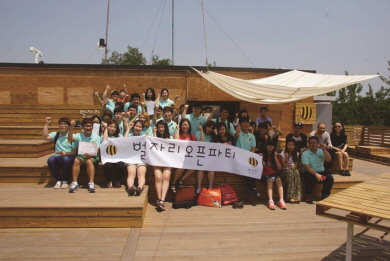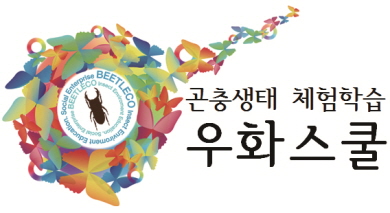
Their primary purpose is to change people’s negative perceptions toward insects and to form a bond between people and insects to create a society where they can coexist in harmony.
“BeetleEco” was founded in 2011, when the current CEO Han Lee-gon from Kangwon University and his fellow students were deeply moved by the world’s first city beekeeping project by Tanaka Atsuo, which delivered a hopeful message to the world that bees and other insects can coexist peacefully with humans.
In fact, 60 percent of organisms on earth consists of insects, and they provide habitats for many plants and animals, and provide 70 percent of what people consume. With people’s negative stereotype toward insects, however, many have become extinct.
Hoping to build a bridge between insects and people, BeetleEco started with “Sweetish project,” currently known as “Bee space.” The members found out that 90 percent of the total domestic bee population was gone due to a spread of disease in 2010. As a result, the number of bees was too small to cross-pollinate, thus causing serious ecological problems.
To increase the number of bees, BeetleEco has been actively beekeeping in the city, attempting to recover suitable habitats for bees. The enterprise expanded the project to rooftop gardening. Members of BeetleEco started gardening on the roof of Kangwon University, believing that rooftop gardening can resolve the city heat island effect and lessen the concentration of CO2 and dusts.
“We wanted the rooftop gardening to be a space not only for BeetleEco or students, but also for all citizens living in the community,” said Chung Ha-song, COO of the BeetleEco. “So we recruited university students who were interested and started the Bee Space Supporters. The supporters take care of the garden by themselves, plan how to advertise our campaigns and webzines, and try to make the space enjoyable both for the bees and people. Now, we are contemplating other ways for more people to be involved in the Bee Space.”

Moreover, the organization started an after school program in middle and high school called “Uwha School.” It is an educational program designed for youths to change their perceptions towards insects. “Uwha” in Korean means the moment when caterpillars break through their chrysalis as a fully grown butterfly. The Uwha School aims to raise youths to perceive, love and have interest in insects through seeing, touching, feeling and acting on how to preserve nature.
The most popular class in Uwha School is the “Regional forest insect collecting program.” During each season except winter, children can go out to the nearby forests and explore how the ecosystem and insects go through changes.
“After class, children who used to scream when insects were in sight and joke that all insects should be dead were now able to differentiate insects and remark that they will miss insects when winter comes,” Chung noted.
Other educational programs include “Uwhaschool-kids” which targets young children to help them break free of negative perception toward insects. The enterprise is also managing experience-based nature classes for patients with atopy and asthma to improve their health and get closer to nature.
Finally, there’s an eco-friendly program for housewives called “Eco-mom” which is designed to offer lessons on how to stay environment-friendly when engaging in everyday household tasks and activities.
Although BeetleEco now draws attention from a large number of people, it used to face difficult times just like any other start-ups.
“Having started only with young minds and guts, we had trouble developing specific programs, and as time went by, tensions arose between co-workers. In the end, the only solution was to hold on and continue to do what we could. I believe that the difficulties in the beginning were what led us to here.”
After Bee Space and Uwha School, BeetleEco is now developing a new R&D program as the next step in order to develop eco-friendly insecticide that does not harm bees. The business uses BeetleEco’s beekeeping bees to test which natural materials are harmless.
“We will keep on developing various up-to-date programs and actively advertise them so that more people can be aware of our aim,” Chung said. “Meanwhile, we will be putting our heads together for new projects and continue our research on bees and fruitful honey.
Lee Jae-lim
jenie1995@ewhain.net

